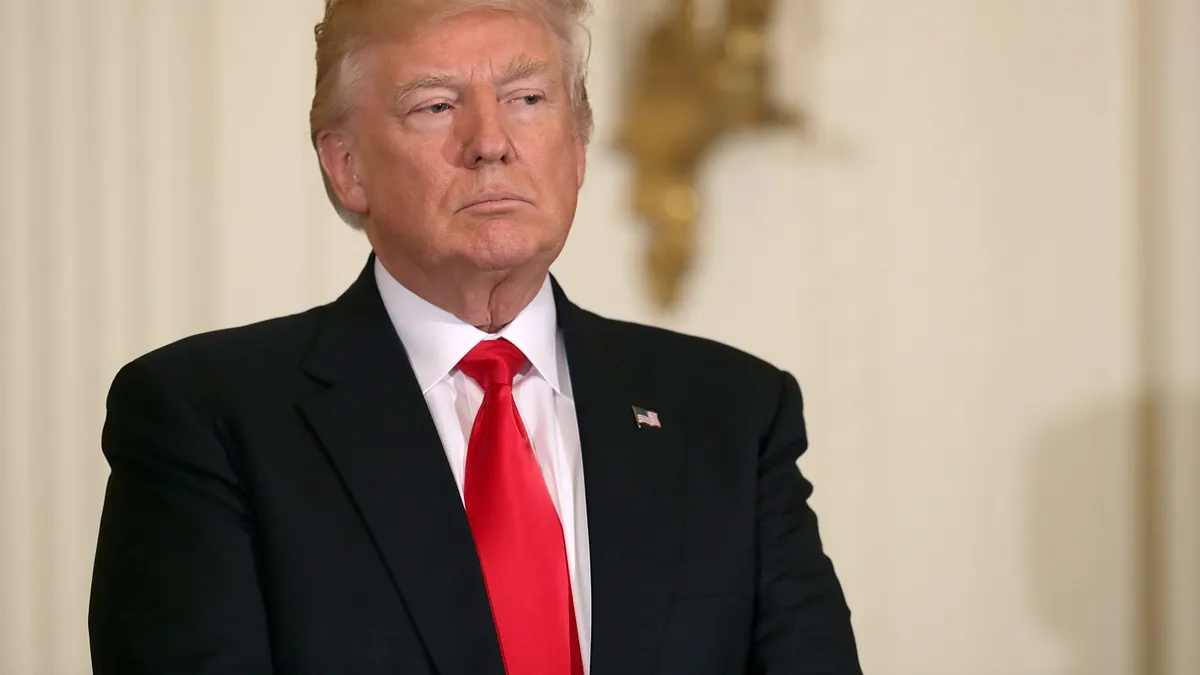Dive Brief:
-
President Donald Trump on Thursday ordered tariffs on imported steel and aluminum with exemptions for Canada and Mexico.
-
The order imposes a 25% tariff on foreign steel and 10% tariff on foreign aluminum. The tariffs, not yet officially signed, will take effect 15 days after they are signed.
-
Energy companies from the oil, gas, solar and wind sectors spoke out against the tariffs, saying they will increase the cost of infrastructure projects and could derail Trump's "energy dominance" agenda.
Dive Insight:
Trump's decision to move forward with tariffs came during a tumultuous week in Washington, where the president's tariff plan pushed his chief economic advisor, Gary Cohn, to resign and prompted a letter from 107 House Republicans asking him to abandon the duties.
The move is “deeply, deeply concerning to those who care about international trade policy and rule of law,” Joshua Zive, a senior principal at law firm Bracewell, told Utility Dive.
The U.S. government and international institutions like the World Trade Organization have processes in place to deal with issues like foreign countries "dumping" cheap steel into U.S. markets, Zive said. But the Trump administration chose a different route, using a national security analysis that leaves the administration, and the economy, vulnerable to retaliation from countries seeking amends through the WTO.
“It is classic heavy handed trade policy. In two decades, I have never seen anything like this,” he said, predicting that the effects would “ricochet” throughout the economy.
While steel makers generally cheered the announcement, other industries are wary of increased prices for steel and aluminum, as well as potential retaliation from other countries.
In the energy industry, oil and gas interests have been among the most vocal opponents of the tariffs. Earlier this week a coalition of oil and gas, and pipeline groups urged Trump to reconsider his plan. And Mark Perry, a scholar at the American Enterprise Institute, in a Wednesday blog said the tariffs would “derail” the president’s “energy dominance” agenda by raising the prices on the steel needed for pipelines and drilling rigs.
Tom Kiernan, CEO, American Wind Energy Association, sounded a similar theme.
“Steel tariffs will decrease competition and trade, ultimately making capital-intensive energy infrastructure projects more expensive by adding cost for U.S. manufacturers along the supply chain,” he said in a statement issued before the announcement. The policy, he said, would “run counter to the administration’s goal of U.S. energy dominance and harm the U.S. manufacturing workers supporting the wind industry’s rapid growth.”
The Solar Energy Industries Association also urged the president to reconsider his decision. Steel and aluminum tariffs would add costs to solar projects, particularly to large scale solar projects, Abigail Ross Hopper, president and CEO of the SEIA, said in a statement.
She also noted that the new tariffs come on top of the 30% tariff Trump imposed on some foreign solar panels earlier this year. “There has been very little interest in building substantial new solar manufacturing capacity as a result of solar tariffs,” Ross Hopper said. “The actual number of jobs added because of solar tariffs will be negligible under the best of circumstances, while the number of jobs likely to be lost because of these tariffs is 23,000.”














